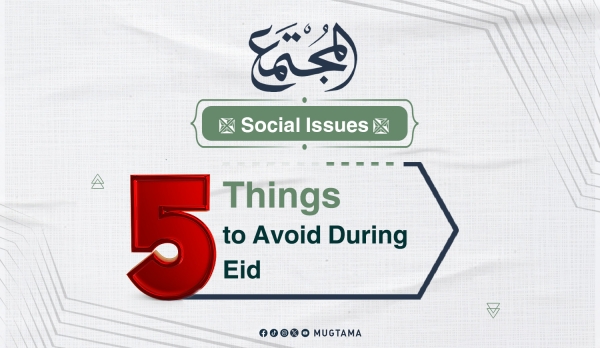With the approach of Eid al-Fitr, filled with joy and happiness, Muslims continue their preparations to celebrate this occasion after a month of fasting, night prayers, seclusion, charity, and good deeds, asking Allah for acceptance, forgiveness, and emancipation from Hellfire.
Some people rejoice on this day by breaking their fast and enjoying the lawful blessings, while continuing their acts of worship by maintaining family ties, visiting relatives, checking on neighbors, and bringing happiness to fellow Muslims. However, others mistakenly believe that Eid is a day of unrestricted amusement, indulging in the forbidden under the pretext of joy and making up for what they abstained from in Ramadan.
Yet, a wise Muslim knows that the acceptance of their fasting and prayers lies in continuing their obedience to Allah. Their joy should align with Allah’s laws and the Sunnah of His Prophet ﷺ, realizing that Eid is not for sinning but for enjoying what is permissible.
These lines summarize five matters that some people fall into, which every Muslim should avoid to prevent committing sins, wrongdoing, or innovation.
1. Fasting on Eid is Forbidden
It is prohibited to fast on Eid, as stated in the authentic collections of Al-Bukhari and Muslim, where Abu Sa’id reported that The Prophet ﷺ forbade to observe fast on two days the day of Fitr and the day of Sacrifice ('Id-ul-Adha). Scholars explain that the reason for the prohibition is to mark the end of Ramadan distinctly by eating after it, while Eid al-Adha is linked to the sacrificial ritual, which involves eating from the slaughtered animal. If fasting were allowed, the meaning of the sacrifice would be lost.
However, a Muslim may fast on the second day of Eid and choose any days to fast the six days of Shawwal, whether consecutively or separately, as the Prophet ﷺ said: “If anyone fasts during Ramadan, then follows it with six days in Shawwal, it will be like a perpetual fast.” (Narrated by Muslim)
2. Disliked Practice of Visiting Graves on Eid
Visiting graves on Eid is discouraged, as it brings sadness on a day that Allah has designated for joy and celebration. Instead, it is better to visit the living and exchange Eid greetings. Some people have the custom of distributing food in cemeteries on Eid, which has no basis in Islamic teachings. Sheikh Ibn Baz stated that specifying Eid, Friday, or any particular day for visiting graves is not established in Islam. Rather, visiting graves should be done periodically as circumstances permit, in line with the Prophet’s ﷺ instruction: “Visit the graves, for they remind you of the Hereafter.”
3. Women Going Out in Adornment in Front of Non-Mahram Men
One common issue on Eid is women going out wearing makeup and revealing clothing as if Eid were an occasion for beautification and exposure. It is forbidden to wear transparent or tight-fitting clothes that reveal the body, or to apply perfume when going out. However, this does not mean that women should not attend the Eid prayer; in fact, it is recommended for them to do so. Even menstruating women are encouraged to go out and witness the gathering, provided they do not enter the prayer area. The important condition is that they go out modestly dressed and without perfume, as Allah says: "And abide in your homes and do not display yourselves as [was] the display of the former times of ignorance." (Al-Ahzab: 33)
4. The Prohibition of Fireworks and Firecrackers
Using fireworks and firecrackers (known as tartaan in some regions) on Eid or any other time is harmful and wasteful. These cause harm, waste money, and disturb others. The Prophet ﷺ said: “It is not lawful for a Muslim to frighten another Muslim.” (Narrated by Abu Dawood and Ahmad)
Firecrackers can also lead to serious accidents, such as fires or injuries to bystanders. The Prophet ﷺ warned: “There should be neither harming nor reciprocating harm.” Additionally, spending money on such things falls under extravagance, which is prohibited in Islam, as Allah says: "O children of Adam, take your adornment at every masjid, and eat and drink, but do not be excessive. Indeed, He does not like those who commit excess." (Al-A'raf: 31)
5. Indulgence in Sinful Activities
Many people, especially the youth, are deceived by Satan into thinking that Eid is a time for unrestrained entertainment, mixing between genders, and staying up late in inappropriate gatherings. This can lead to serious sins such as drinking alcohol, taking drugs, watching immoral content, harassing women, and engaging in other prohibited acts. The true joy of Eid should come from lawful pleasures, gratitude for completing Ramadan, and continuing acts of obedience.
A Muslim should celebrate in ways that are permissible, avoiding anything that displeases Allah, so that their Eid remains a source of blessing rather than regret.
-------------------------------------------------------------


